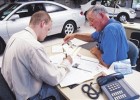
Getting into a car accident is difficult enough, due to the shock and trauma of the incident, not to mention any injuries you sustain and the state of your car afterwards, and, of course, the stress and worry of making an auto insurance claim and whether it will be accepted. However, when you’re caught up in an auto insurance scam, well, what was already a tough situation becomes even worse.
Unfortunately, auto insurance scams are on the up, and it is thought that approximately 20 percent of auto injury claims and as many as 10 percent of car damage claims come about as the result of auto accident scams, and are, in fact, bogus claims.
The really sad thing is that auto insurance scams hurt law-abiding drivers, who are just trying to go about their business hurting no one, the most, not only because it is quite often them who get caught up in accidents, but also because it can add between $200-300 annually to the average auto insurance policy.
To ensure that you are at least aware of the most common auto insurance scams, and so that you can hopefully avoid them, here are some of the most common ones:
Forced Rear-Endings
Forced rear-endings, also known as ‘crash for cash’ scams in some places, are scams where the fraudulent party will come to a very swift stop or simply slow down to a crawl, in areas of busy traffic in the hopes that some unsuspecting driver will go right into the back of them, allowing them to make a claim for whiplash, back pain or similar.
A personal injury lawyer specialized in car accidents will more often than not be able to spot when you’ve been a victim of such an incident, and help you to fight any claim against you. However, it is always better to take preventative measures, which in this case means not allowing drivers to follow you closely, leaving plenty of space to stop in a hurry and generally close paying attention to what is going on around you when you’re driving.
The Not So Good Samaritan
Imagine that you’ve been in a car accident and you’re waiting by the roadside for the authorities or a tow truck to get to you. A callous con artist may approach you acting as a third-party insurance professional, and he or she might try and convince you to do business with a particular health center or clinic for the injuries you’ve sustained, or use a certain auto shop to fix up your car. They might even suggest a specific personal injury lawyer. Chances are you won’t have heard of the health center, auto shop or lawyer, and that’s because they don’t exist – the ruse is there solely to convince you to part with your personal information so that they – the not so good samaritan- can submit a false auto insurance claim using your details!
Luckily, it’s easy to avoid this scam by simply checking out any professionals you use after your claim before using them, and by refusing to give your personal details to an unknown individual.
Fake Injury Claims
Perhaps, the most common auto insurance scam is the false injury claim. This is a claim of no substance that is made by one or more parties involved in an auto accident. Quite often, whiplash or back pain are the complaints used to make fake injury claims.
You’ll want to be on the lookout for any signs that another driver you’ve been involved in an accident with is faking it because, if they submit a fake claim to your insurer, it could push up your premiums in the future.
Signs that a claim might be fraudulent include drivers who act perfectly fine until an official shows up when they start hamming it up acting like they’re in immense pain, and claims that are made long after the accident.
Another way of avoiding being stung by a fake injury claim is to file a report with the relevant authorities, even if the incident is very minor. If the other driver knows there’s an official report, they may be less inclined to make a false claim, and if not, the insurance company is less likely to be fooled.
It can be quite difficult to avoid getting embroiled in an auto insurance scam, especially now that they are so common, but if you keep your wits about you, your eyes on the road, and bear in mind the information about the most common scams above, you are much less likely to be stung by the bad guys!


















